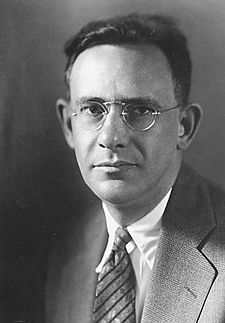Edward Sapir
 Edward Sapir (; January 26, 1884 – February 4, 1939) was an American anthropologist-linguist, who is widely considered to be one of the most important figures in the development of the discipline of linguistics in the United States.
Edward Sapir (; January 26, 1884 – February 4, 1939) was an American anthropologist-linguist, who is widely considered to be one of the most important figures in the development of the discipline of linguistics in the United States.Sapir was born in German Pomerania, in what is now northern Poland. His family emigrated to the United States of America when he was a child. He studied Germanic linguistics at Columbia, where he came under the influence of Franz Boas, who inspired him to work on Native American languages. While finishing his Ph.D. he went to California to work with Alfred Kroeber documenting the indigenous languages there. He was employed by the Geological Survey of Canada for fifteen years, where he came into his own as one of the most significant linguists in North America, the other being Leonard Bloomfield. He was offered a professorship at the University of Chicago, and stayed for several years continuing to work for the professionalization of the discipline of linguistics. By the end of his life he was professor of anthropology at Yale. Among his many students were the linguists Mary Haas and Morris Swadesh, and anthropologists such as Fred Eggan and Hortense Powdermaker.
With his linguistic background, Sapir became the one student of Boas to develop most completely the relationship between linguistics and anthropology. Sapir studied the ways in which language and culture influence each other, and he was interested in the relation between linguistic differences, and differences in cultural world views. This part of his thinking was developed by his student Benjamin Lee Whorf into the principle of linguistic relativity or the "Sapir–Whorf" hypothesis. In anthropology Sapir is known as an early proponent of the importance of psychology to anthropology, maintaining that studying the nature of relationships between different individual personalities is important for the ways in which culture and society develop.
Among his major contributions to linguistics is his classification of Indigenous languages of the Americas, upon which he elaborated for most of his professional life. He played an important role in developing the modern concept of the phoneme, greatly advancing the understanding of phonology.
Before Sapir it was generally considered impossible to apply the methods of historical linguistics to languages of indigenous peoples because they were believed to be more primitive than the Indo-European languages. Sapir was the first to prove that the methods of comparative linguistics were equally valid when applied to indigenous languages. In the 1929 edition of ''Encyclopædia Britannica'' he published what was then the most authoritative classification of Native American languages, and the first based on evidence from modern comparative linguistics. He was the first to produce evidence for the classification of the Algic, Uto-Aztecan, and Na-Dene languages. He proposed some language families that are not considered to have been adequately demonstrated, but which continue to generate investigation such as Hokan and Penutian.
He specialized in the study of Athabascan languages, Chinookan languages, and Uto-Aztecan languages, producing important grammatical descriptions of Takelma, Wishram, Southern Paiute. Later in his career he also worked with Yiddish, Hebrew, and Chinese, as well as Germanic languages, and he also was invested in the development of an International Auxiliary Language. Provided by Wikipedia
1
2
3
by Sapir, Edward, 1884-1939
1930
1930
This item is not available through EZBorrow. Please contact your institution’s interlibrary loan office for further assistance.
Book Chapter
4
5
by Sapir, Edward, 1884-1939
1931
1931
This item is not available through EZBorrow. Please contact your institution’s interlibrary loan office for further assistance.
Book Chapter
6
by Sapir, Edward, 1884-1939
1922
1922
This item is not available through EZBorrow. Please contact your institution’s interlibrary loan office for further assistance.
Book Chapter
7
by Sapir, Edward, 1884-1939
1930
1930
This item is not available through EZBorrow. Please contact your institution’s interlibrary loan office for further assistance.
Book Chapter
8
by Sapir, Edward, 1884-1939
Ottawa : Royal Society of Canada, 1913
Ottawa : Royal Society of Canada, 1913
This item is not available through EZBorrow. Please contact your institution’s interlibrary loan office for further assistance.
Book Chapter
9
by Sapir, Edward, 1884-1939
1910
1910
This item is not available through EZBorrow. Please contact your institution’s interlibrary loan office for further assistance.
Book Chapter
10
by Sapir, Edward, 1884-1939
1921
1921
This item is not available through EZBorrow. Please contact your institution’s interlibrary loan office for further assistance.
Book Chapter
11
by Sapir, Edward, 1884-1939
New Haven, Conn. : Human Relations Area Files, 1970
New Haven, Conn. : Human Relations Area Files, 1970
This item is not available through EZBorrow. Please contact your institution’s interlibrary loan office for further assistance.
Book
12
13
15
16
by Sapir, Edward, 1884-1939
Ottawa : New York : Government Printing Bureau, Johnson Reprint Corp., 1916; 1968
Ottawa : New York : Government Printing Bureau, Johnson Reprint Corp., 1916; 1968
Book
17
18
by Sapir, Edward, 1884-1939
Chicago : University of Chicago Press, 1907
Chicago : University of Chicago Press, 1907
This item is not available through EZBorrow. Please contact your institution’s interlibrary loan office for further assistance.
Book
19
by Sapir, Edward, 1884-1939
Berkeley : University of California Press, 1951
Berkeley : University of California Press, 1951
This item is not available through EZBorrow. Please contact your institution’s interlibrary loan office for further assistance.
Book
20
by Sapir, Edward, 1884-1939
[Place of publication not identified] : [American Anthropologist?], 1907
[Place of publication not identified] : [American Anthropologist?], 1907
This item is not available through EZBorrow. Please contact your institution’s interlibrary loan office for further assistance.
Book